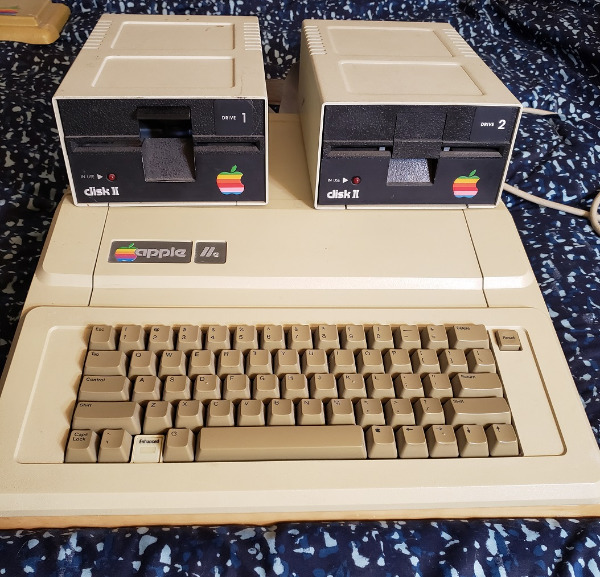1970s Computer Clubs

The Apple 1 as displayed at the Computer History Museum
On March 5, 1975, the Homebrew Computer Club first met in a garage near Menlo Park in Silicon Valley, California.
On that day, I was across the country in my last semester at Rutgers. I had taken one course in computer programming, using Fortran, which had been around in some earlier forms since the late 1950s. We used a box of punch cards to create a program. I had looked into the class as an auditor, for no credit and not on my transcript, because I had talked to the professor after an information session he gave, and he was curious to see what an English major would do in his class.
My afterschool and vacation job in high school was doing printing for a liquor distributor. They had a room with huge computers using tape drives and cards, and I would sometimes wander in there and talk to the operator. Of course, I understood nothing about what he was doing. He was in a unique place in that position because no one in the company understood what he was doing except him and his one assistant. And yet those computers, printed all the invoices which I would later have to box up and file in the warehouse. Though they were using the computer to print them all, no one could access that data from their desktop, so if someone wanted a copy of an invoice, they had to dig through a file cabinet.
That 1970 computer was certainly not for personal use, and no one had a personal computer because they did not exist. Most of my fellow students didn't imagine we would ever have a computer in our home. They were gigantic — a computer easily took up an entire room. And they were very, very expensive, costing about a million dollars each. Not even computer engineers or programmers who made a living working on computers had access to a personal computer.
So this California club served a real need for tech-minded people But many of these tech-minded people wanted to build personal computers for fun. And they decided to start a hobbyist club to trade circuit boards and information and share their enthusiasm. Among the early members were high school friends Steve Jobs and Steve Wozniak. Eventually, they would design and build what tey called the Apple I and II computers and brought them to the club to show them off. Lee Felsentein and Adam Osborne were also members and would create the first mass-produced portable computer, the Osborne 1.
Wozniak would write "The theme of the club was 'Give to help others.' Each session began with a 'mapping period,' when people would get up one-by-one and speak about some item of interest, or a rumor, and have a discussion. Somebody would say, 'I've got a new part,' or somebody else would say he had some new data or ask if anybody had a certain kind of teletype."
I started teaching in a junior high school, in the fall of 1975, and shortly thereafter, the school got a terminal that was connected to a mainframe at some university in New Jersey. It was first used by one of the math teachers for a kind of computer club. I did go to his classroom a few times just to see how it worked but I saw no connection to what I had learned about programming in college.
It would be a few years before the first personal computers appeared in the school We had a lab that was used for the first actual computer class. It was a classroom full of standalone TRS 80s. TRS stands for Tandy RadioShack, though later they were nicknamed Trash 80s. I took a professional development class using those computers where we learned to program in BASIC. I created a vocabulary flashcard program that I was able to use with a few of my English classes during periods when the lab was not being used by the math teacher. The program was crude. The graphics were basically nonexistent, but the kids and I found it very interesting.
I remember one teacher who was in the professional development class, saying we will all have to learn to program in the future. I was sure she was wrong. I had no doubt that computers would play a role in our teaching future, but I was also sure that other people would be writing the programs and we would only be users.

The first computer I had in my classroom was an Apple IIe. Since I had some computer background and more so because I had some interest in learning more, I became the computer coordinator for the building. That meant my computer had two disc drives so that I could copy software that we had purchased and were allowed to copy. MECC was a big source of classroom software back then.
The first computer I bought for home use was the same as what I had in my classroom which made sense because then I could use the software home too. This hardware was expensive. I paid more for the Apple dot matrix printer than I paid for my laptop last year.
We remained an aApple school, and an apple family for a few years until a new person moved into the position of district computer coordinator. He swapped out all the Apple computers for what we would call IBM clones, but we're the early Windows95-equipped computers. When I bought my next computer, it was one using Windows 95.
When I left teaching secondary school in 2000 and went to work at NJIT, all the computers used Windows except for the school of architecture, which was an Apple Mac building. They were their own little tech world. And so I lost contact with the Apple world in those days when even TV commercials and print ads would argue about whether you were a Windows or Mac kind of person. I remember one professor saying to me that he was surprised I was not using a Mac because I seemed like "a creative type."

